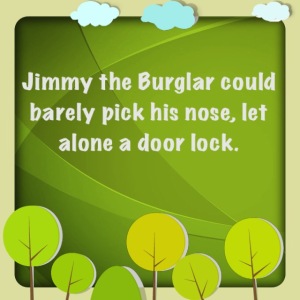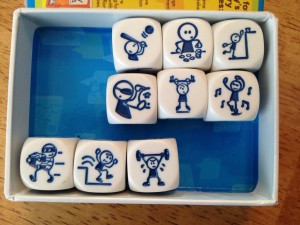I did it!
Families inspire us and intimidate us. Jimmy’s mother, father and brother are all members of the Burglars Union Guild (BUG), and he is expected to follow in their footsteps. Jimmy has slippery fingers and not in the slick, pickpocket ways; he drops things. That lack of dexterity is just the start of his struggles to gain entrance into the most elite thief organization. The story of his life is now immortalized in electronic bytes. I published a book.
I didn’t do all that writing in one day, as I proposed in my original challenge. I also spent more than 10 hours writing Jimmy the Burglar. Regardless, I completed the challenge.
I feel really good about that because this is my first fiction piece in a long, long time. Fiction is easier to write than memoir because I could make up whatever stuff I wanted. Fiction is also harder to write than a memoir because I had to make up whatever stuff I wanted.
This is my third self-published book, and I learn new elements with each effort. This time, I experimented by writing the first draft in longhand. At 2 hours and 56 minutes of writing, I hit a wall: great story elements, but no tension. Typing that first part in gave me time to think about the story I wanted to tell here and now and in 10-ish hours. I initially focused on the entire family history as related to the evolution of the Guild, but in that writing, I developed incredible backstory fodder for future Jimmy short stories. The tale worth telling today is the evolution of Jimmy’s final exam for BUG membership: his MOTH (Modus Operandi Thesis Heist). After the humiliation he experienced working with Big M, it is vital that Jimmy’s MOTH get all the details right.
At 7 hours and 42 minutes, I was having Too Much Fun writing. So much fun that, I forgot to reset the timer at one point.
After 16 hours (approximately) and 5100 words (23 pgs.), you can read Jimmy the Burglar’s first adventure on Amazon.com.
How did your story turn out? If you completed the challenge, post your link below. If you didn’t, share your thoughts now about the experience for all of us so we can learn from it. And for me, I’d love to know your thoughts about my book. Whaddya think?
If you’re looking for some inspiration and encouragement to complete a book like this, there is a day-long workshop planned for early 2015 in the metro Detroit area. Stay tuned for the details.
Even if publication isn’t your goal, doing a challenge like this is immensely satisfying. I have typed “The End” on a piece of my writing and am now moving on to “The Next.”

